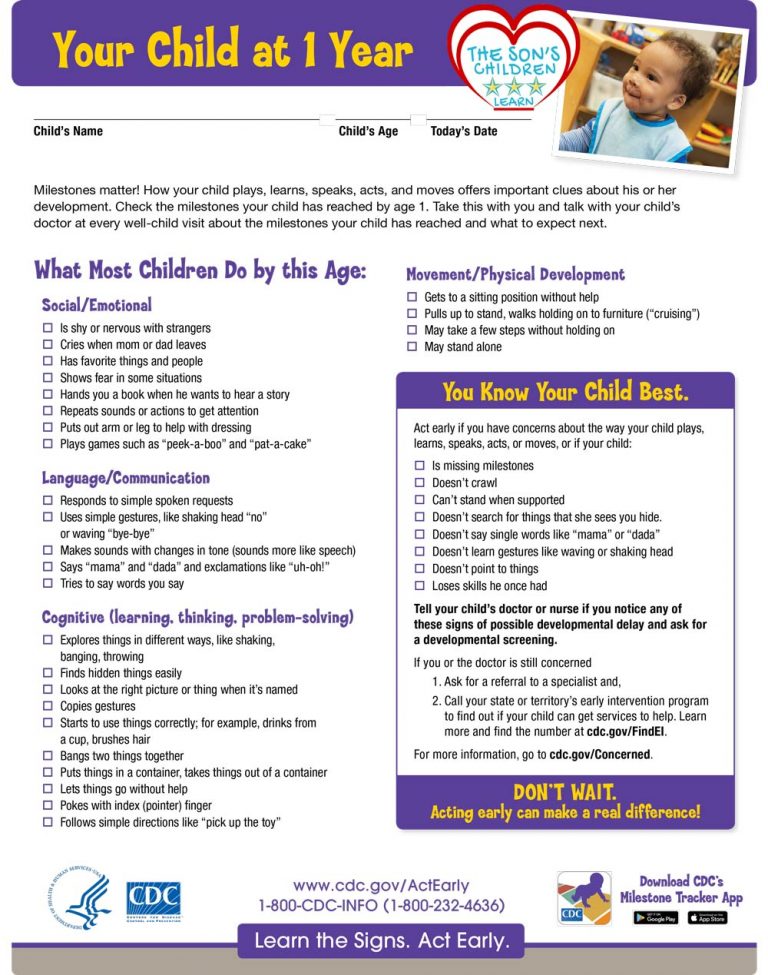
As a new mother, you must be wondering how your little one is growing and if they are meeting their milestones. The Centers for Disease Control and Prevention (CDC) has created a guide to help parents understand the most common developmental milestones for babies up to two years old. Here, we will discuss some of the highlights of this guide to give you a better understanding of what to expect.
Table of Contents
Physical Milestones
One of the first areas of focus in the CDC guide is physical development. This includes milestones such as rolling over, sitting up, crawling, and walking. According to the guide, most babies will start rolling over by 4 months, sitting up alone by 6 months, and crawling by 9 months. By their first birthday, most babies will be walking or attempting to walk on their own.
Language Milestones
Another important area of development is language. Parents often wonder when their baby will start talking, and the CDC guide provides some helpful information. The guide states that most babies will start babbling by 4 months and saying simple words like “mama” and “dada” by their first birthday. By two years old, most toddlers will be able to use simple sentences and understand basic questions.
Social and Emotional Milestones
Babies also go through significant social and emotional development in their first two years of life. They begin to show more interest in people and their surroundings, and may even become shy around strangers. By the time they are one year old, most babies will be able to express their emotions (like anger, happiness, and sadness) and will start to show affection towards familiar people.
Cognitive Milestones
Finally, there are cognitive milestones, which refer to how babies learn and understand the world around them. The CDC guide highlights that most babies will be able to follow simple commands like “come here” by 1 year old, and will be able to point to objects and say a few words. As they approach two years old, most toddlers will begin to sort toys by shape and color, and solve simple problems like putting a ball through a hole.
Conclusion
Of course, every baby is different and will develop at their own pace. However, the CDC guide can give parents a better understanding of what to expect and what milestones to look for. Remember that if you have any concerns about your baby’s development, you should speak to your pediatrician for guidance.
Frequently Asked Questions:
-
What are developmental milestones?
Developmental milestones are tasks or abilities that most babies can do by a certain age range. These milestones are important indicators of a baby’s growth and development.
-
When should I be concerned about my baby’s development?
It’s important to remember that not all babies develop at the same pace. However, if your baby does not seem to be meeting their milestones or shows other signs of delay (like not responding to sounds or not making eye contact), you should speak to your pediatrician for guidance.
-
What can I do to support my baby’s development?
There are many things you can do to support your baby’s development, such as talking to them often, providing safe spaces for them to explore, and offering age-appropriate toys and activities. You can also speak to your pediatrician for more guidance on supporting your baby’s development.
-
Can babies develop skills out of order?
Yes, it is possible for babies to develop skills out of order. For example, some babies may start walking before they can fully crawl. However, if your baby seems to be developing skills in a significantly different order than what is described in the CDC guide, it could be a sign of a developmental delay.
-
How often should I check my baby’s progress?
It’s a good idea to check your baby’s progress regularly, but not obsessively. Your pediatrician will likely monitor your baby’s growth and development at regular check-ups, so be sure to bring up any concerns or questions you may have during those appointments.
